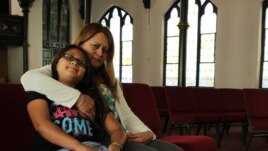07 August, 2017
Since Donald Trump was elected president, the number of churches in the United States declaring themselves sanctuaries – or safe places – for undocumented immigrants has more than doubled.
However, few people are taking refuge in them.
After Trump's victory last November, about 400 churches declared themselves sanctuaries. That brought the total number of sanctuary churches in the country to 800, according to the nonprofit group Church World Service.
The rise came after Trump said he wanted to deport millions of undocumented people from the United States.
However, many undocumented immigrants say they consider taking refuge in the churches a risky move.
Only 12 people are known to be taking refuge in these churches.
Ray Ybarra Maldonado is an immigration lawyer in Phoenix, Arizona. He represents Mexican-born Guadalupe Garcia de Rayos. She was one of the first undocumented immigrants deported under Trump.
He says people who choose to take sanctuary in churches are "strong willed." He calls such a decision a "personal sacrifice to make a larger statement towards immigration law."
"It's not just about an individual staying here; it's something much bigger than that," he said.
Mother granted a stay
Nury Chavarria is originally from Guatemala. She has four children. She is the most recent immigrant to publicly take sanctuary in a church.
This week, she was given a stay of deportation. That is when an order of deportation is temporarily delayed. She had spent six nights in the Igelsia de Dios Pentecostal in New Haven, Connecticut.
Chavarria has no criminal record. She was previously given a stay of removal for humanitarian reasons, says Khaalid Walls, a spokesman for U.S. Immigration and Customs Enforcement, or ICE.

Nury Chavarria, 43, poses with her 9-year-old daughter, Hayley inside Iglesia De Dios Pentecostal church in New Haven, Conn., on Monday, July 24, 2017
Chavarria applied for asylum many years ago, but her application was denied. This June, ICE federal officials told her she had one month to leave the country and return to Guatemala.
Undocumented immigrants like Chavarria who take sanctuary never have promises of safety from deportation. However, ICE policy does discourage arrests at "sensitive locations." This includes churches.
Immigrants resist offer
The idea of "sanctuary" is an old one. It comes from an ancient Judeo-Christian tradition. Today, some religious communities offer refuge to protest federal immigration policy.
Yet, immigrants do not always wish to accept churches' offer of sanctuary. Garcia de Rayos, for example, decided against taking sanctuary in a church, her lawyer said.
Maldonado, the lawyer, said taking sanctuary is "almost like being incarcerated. You can't live the life you want to live."
Garcia de Rayos followed the immigration rules. She knew deportation was likely. She was arrested when she arrived at her ICE check-in in February.
In the past, many immigrants had regular check-in meetings with ICE. They went to such meetings without fearing deportation. Under other administrations, undocumented people were not likely to be deported if they did not have a criminal record or were important to their community.
Attention brings help
Chavarria decided to take sanctuary so she could stay with her children, says Kica Matos, the director of immigrant rights at the Center for Community Change. The center represents Chavarria in court.
Chavarria received attention from Connecticut's two Democratic senators, Chris Murphy and Richard Blumenthal, as well as Governor Dannel Malloy. They all wanted to support her.
Another undocumented immigrant, Jeanette Vizguerra, also took sanctuary in a church. She spent 86 nights in a church in Denver, Colorado, before her application for a stay of deportation was approved in May.
Colorado Senator Michael Bennet and two other Democratic congressmen introduced a law that permitted her and another immigrant to remain in the United States until 2019.
While Vizguerra was in sanctuary, TIME magazine named her one of the most influential people of 2017.
The media attention was helpful for Vizguerra, Maldonado says.
"The more high profile you can make your case, the more you can show the government that the rest of the world is watching," he said.
Vizguerra and Chavarria, however, are exceptions. There are currently 12 immigrants known to be living in churches. They are all hoping for some form of relief from deportation. But so far, they have not received any. This may discourage others from taking sanctuary.
Noel Anderson works on immigrants' rights at Church World Service.
"There's a lot of fear in the community," Anderson said. "The fear is that they could be stuck in a church for years on end, or if their story is public, they may be more of a target."
I'm Jill Robbins.
Gabriella Borter originally wrote this story for Reuters. Phil Dierking adapted this story for VOA Learning English. Ashley Thompson was the editor.
Do you think churches should offer sanctuary? We want to hear from you. Write to us in the Comments Section or on 51VOA.COM.
_____________________________________________________________
Words in This Story
attorney - n. another word for lawyer
deport – v. to force (a person who is not a citizen) to leave a country
discourage – v. to make (someone) less determined, hopeful, or confident
incarcerate – v. to put (someone) in prison
Judeo-Christian – adj. relating to both Judaism and Christianity
priority – n. something that is more important than other things and that needs to be done or dealt with first
high profile – adj. attracting a lot of attention in newspapers, on television, etc.
relief – n. a pleasant and relaxed feeling that someone has when something unpleasant stops or does not happen